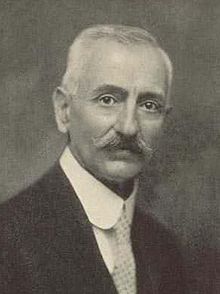Aleksa Šantić
| Aleksa Šantić | |
|---|---|
 |
|
| Born |
27 May 1868 Mostar, Bosnia Vilayet, Ottoman Empire |
| Died | 2 February 1924 (aged 55) Mostar, Kingdom of Serbs, Croats and Slovenes |
| Occupation | Poet |
| Nationality | Austro-Hungarian (1868–1918) Yugoslav (1918–1924) |
| Ethnicity | Serb |
Aleksa Šantić (Serbian Cyrillic: Алекса Шантић; 27 May 1868 – 2 February 1924) was a Bosnian Serb poet. He was the editor-in-chief of the review Zora (1896–1901).
Aleksa Šantić was born into a Herzegovinian Serb family in 1868 in Mostar in the Ottoman Empire. His father Risto was a merchant, and his mother Mara was a housewife. He had three siblings: brothers Jeftan and Jakov and sister Radojka known as Persa; another sister Zorica died in infancy. The family didn't demonstrate much understanding for Aleksa's lyrical talents.
Just as young Aleksa turned 10 years of age, Bosnia Vilayet (including Mostar) was occupied by Austria-Hungary as per decision made by European Great Powers at the Congress of Berlin during summer of 1878.
Aleksa's father Risto died, which is when his brother Miho known as Adža (Aleksa's uncle) got custody of Aleksa and his siblings. After attending schools in Trieste and Ljubljana, Aleksa came back to his native Mostar where he became the editor-in-chief of the review "Zora" (Dawn; 1896–1901). He presided over the Bosnian music association called "Gusle". In this capacity he came into the focus of the life of this region which, by its cultural and national consciousness, showed a stubborn opposition to the German Kulturträger. The product of his patriotic inspiration during the liberating Balkan Wars of 1912–1913 is the book "Na starim ognjištima" (On the Old Hearths; 1913). During World War I he was taken by the Austrians as hostage, but he, unlike Svetozar Ćorović, his brother-in-law, survived the war and saw the realization of his dream—the union of the South Slavs.
Šantić was a prolific poet and writer. He wrote almost 800 poems, seven theatrical plays and some prose. Many of the writings were of high quality and aimed to criticize the Establishment or advocate diverse social and cultural issues. He was strongly influenced by Heinrich Heine, whose works he translated. His friends and peers in the field of culture were Svetozar Ćorović, Jovan Dučić and Milan Rakić. One of his sisters, Radojka (Persa) married Svetozar Ćorović.
...
Wikipedia
